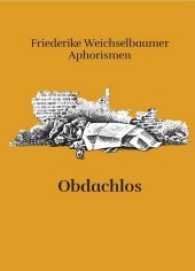- ホーム
- > 洋書
- > ドイツ書
- > Humanities, Arts & Music
- > Linguistics
Full Description
The literature on translation and technology has generally taken two forms: general overviews, in which the tools are described, and functional descriptions of how such tools and technologies are implemented in specific projects, often with a view to improving the quality of translator training. There has been far less development of the deeper implications of technology in its cultural, ethical, political and social dimensions. In an attempt to address this imbalance, the present volume offers a collection of articles, written by leading experts in the field, that explore some of the current communicational and informational trends that are defining our contemporary world and impinging on the translation profession. The contributions have been divided into three main areas in which translation and technology come together: (1) social spheres, (2) education and training and (3) research. This volume represents a bold attempt at contextualizing translation technologies and their applications within a broader cultural landscape and encourages intellectual reflection on the crucial role played by technology in the translation profession.
Contents
Contents: Celia Rico: Translation resources in not-for-profit contexts: A case for immediacy in humanitarian work - Félix Do Carmo/Belinda Maia: Sleeping with the enemy? Or should translators work with Google Translate? - Miguel Ángel Candel-Mora/Laura Ramírez Polo: Translation technology in institutional settings: A decision-making framework for the implementation of computer-assisted translation systems - Silvia Rodríguez Vázquez: Making localised Web content accessible: A collaborative task between the developer and the localiser - Daniel Gallego-Hernández: Business translation training and ad hoc corpora - Kanglong Liu: Investigating corpus-assisted translation teaching: A pilot study - Iulia Mihalache/Alan Bernardi: Social dynamics in the translation technologies sphere: Sharing knowledge and learning tools in collaborative virtual environments - Rocío Baños/Pier Antonio Toto: Challenges and constraints in designing a localisation module for a multilingual cohort - Adrià Martín-Mor/Pilar Sánchez-Gijón: Differences between translations made with and without CAT tools: An empirical approach - Lucía Morado Vázquez/Jesús Torres Del Rey: The relevance of metadata during the localisation process: An experiment - Paola Valli: The importance of being logged: What tool settings can reveal about the behaviour of translators' querying a concordancer - Olga Torres-Hostench/Carmen Bestué Salinas: Technology and e-resources for legal translators: The LAW10n project.








